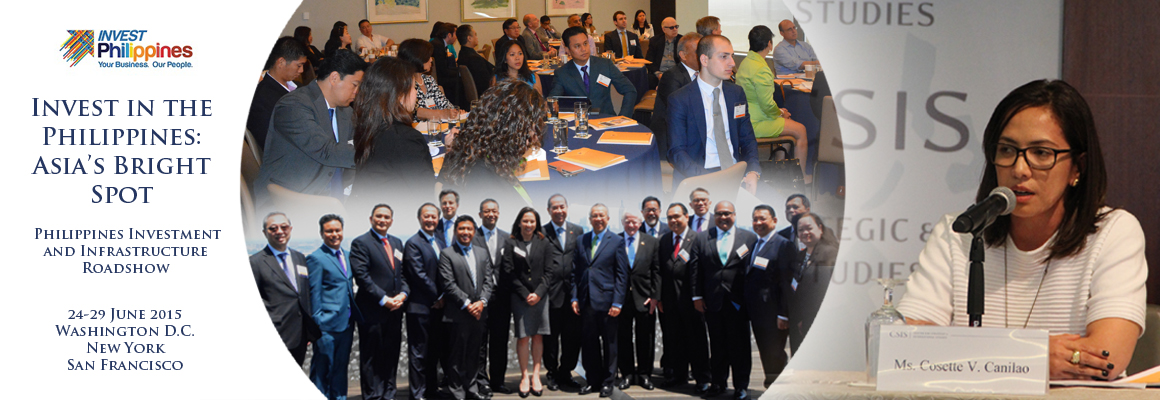
Invest in the Philippines: Asia’s Bright Spot
Philippines Investment and Infrastructure Roadshow
Washington D.C.
New York
San Francisco
June 24-29, 2015
Opening Speech of Executive Director Cosette Canilao
The Philippines recognizes the crucial role of the private sector as the main engine of national growth. The passage of the “Build-Operate-Transfer (BOT) Law” in 1990 was a pioneering initiative in Asia. It upheld and institutionalized the position of the private sector in the nation’s development efforts. This was later amended to include non-traditional and social infrastructure projects in health, education, and agriculture sectors.
Today, under President Aquino’s leadership, he bolstered the role of Public-Private Partnership in addressing infrastructure gaps in the country. He reorganized the Build-Operate-Transfer (BOT) Center into the Public-Private Partnership Center through Executive Order No. 8. The PPP Center is the sole body tasked to facilitate and coordinate the country’s PPP program. Part of its mandate is to manage a revolving fund called the Project Development and Monitoring Facility. This fund is utilized for the conduct of pre-investment studies and bid management of PPP projects. It allowed implementing agencies to hire internationally renowned transaction advisors who are tasked to put together well-structured and bankable projects. The PPP Center also provides Implementing Agencies (IAs) technical advisory support in project development and management and monitors the implementation of PPP priority projects.
On May 2013, Executive order No. 136 amended certain sections of Executive Order No. 8, including the creation of a PPP Governing Board, chaired by the Socioeconomic Planning Secretary, with the Finance Secretary as co-Chair. The PPP Governing Board is the overall policy-making body for all PPP-related matters, including exercising oversight and management functions of the Project Development and Monitoring Facility.
The PPP Center is also responsible for setting the strategic direction of the Philippine PPP Program while creating an enabling policy and institutional environment for PPPs in the Philippines. It is mandated to formulate policy guidelines for PPP transactions, and develop and manage a central database of all PPP programs and projects. To this end, we have pushed for policy and process reforms to enhance the policy environment for PPPs through several policy circulars. We crafted and secured the approval to issue policies on Pipeline Development, Viability Gap Funding, PPP Best Practices, and Termination Payments. Together with the Budget and Finance Departments, we have established the inclusion of the Contingent Liability Fund in our annual General Appropriations Act.
We have likewise developed a PPP Knowledge Management Portal which includes a Virtual Data Room (VDR) system – a highly secure online facility for storing, accessing, and distributing relevant tender documents. We are now using the VDR for three (3) PPP projects that are currently being tendered. We also launched our new website envisioned to be the primary source of reliable PPP information in the country which is also one of the components of the KM Portal. All these institutional, structural and process improvements are aimed at fast-tracking PPP implementation.
Since the launching of the PPP Program four years ago, we have managed to build up and maintain a robust pipeline of well-structured projects. We are currently bidding out 12 PPP projects which include five (5) regional airports, one prison facility, and a port modernization. We have awarded 10 projects with a collective project cost of around USD 4.20 billion (PHP 189 billion), surpassing the six approved solicited PPP projects in the past three administrations.
We ensured that projects are successfully tendered by streamlining various government processes which helped us establish a more responsive and conducive environment for doing PPPs in the country. These initiatives are well-received and have gained the continuous support of the private sector and recognized by various international and local organizations.
Just recently, The Economist hailed the Philippines as the Most Improved Country on PPP readiness in Asia-Pacific. It moved up from its previous status, as an emerging PPP market. The Philippines is now considered a developed PPP market alongside countries like Korea, Japan, and India.
Last March, the PPP Center was recognized as “2014 Asia-Pacific Grantor of the Year” by IJGlobal Project Finance and Infrastructure Journal for its role as a government body that advises awarding authorities on the procurement of infrastructure projects.
Moreover, several governments visited the Center such as Indonesia, Nigeria, Bhutan, Tonga, and Vietnam to seek guidance in developing their own national PPP policy and institutional framework.
To institutionalize the reforms that we have initiated and sustain the gains we have made, we are currently pushing for the amendment of the BOT Law or the passage of the PPP Act. This will incorporate the key lessons we learned from successfully implementing past projects and the reaffirmed global best practices we have put in place.
Also noteworthy is the fact that the Philippine government recognizes the need to provide the right incentives to investors. A rationalized investments scheme can boost the country’s ability to attract both local and more importantly foreign investors who can participate in the big-ticket projects in our pipeline. Participating companies are entitled to fiscal incentives such as income tax holiday, among others. In terms of widening access to sources of funding, the government, through the Monetary Board, has also extended the Single Borrower’s Limit which allows for increased limit on loans extended to entities involved in PPP projects.
With all these developments in the Philippine PPP Program, we highly encourage foreign companies to partner with our strong local companies and with the government to implement critical infrastructure projects in the country. We encourage you to take advantage of this opportunity to be our partner in development. Now is the best time to invest in the Philippines.
We at the PPP Center, the implementing agencies, and all other government stakeholders, remain strongly committed to deliver PPP projects through transparent processes and a level playing field.
Thank you.

